ABOUT
OUR FOCUS
Development and application of innovative techniques for biomarker in human diseases.
We believe that utilizing molecular imaging tools we can uncover abnormalities in cell metabolism and assess treatment efficacy.
OUR APPROACH
Combining principles from bioengineering, chemistry, and physics, we tackle biological challenges through innovative solutions. Application of Magnetic Resonance (MR) molecular imaging methods to investigate biochemical pathways and in vitro, in vivo and in innovative in bioengineered chip systems.
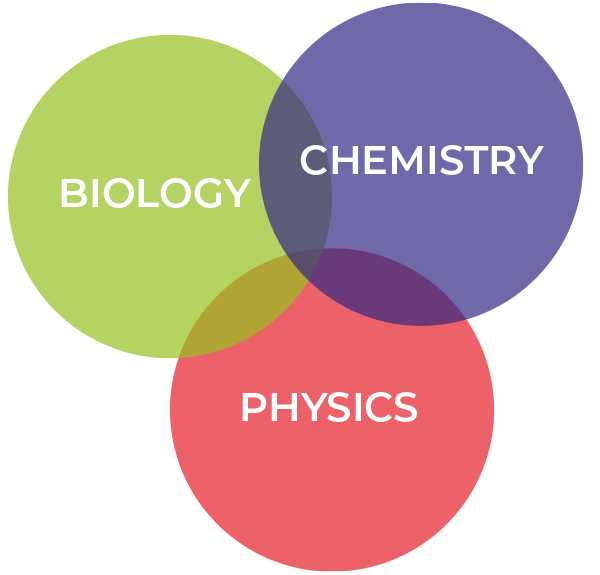
OUR METHODS
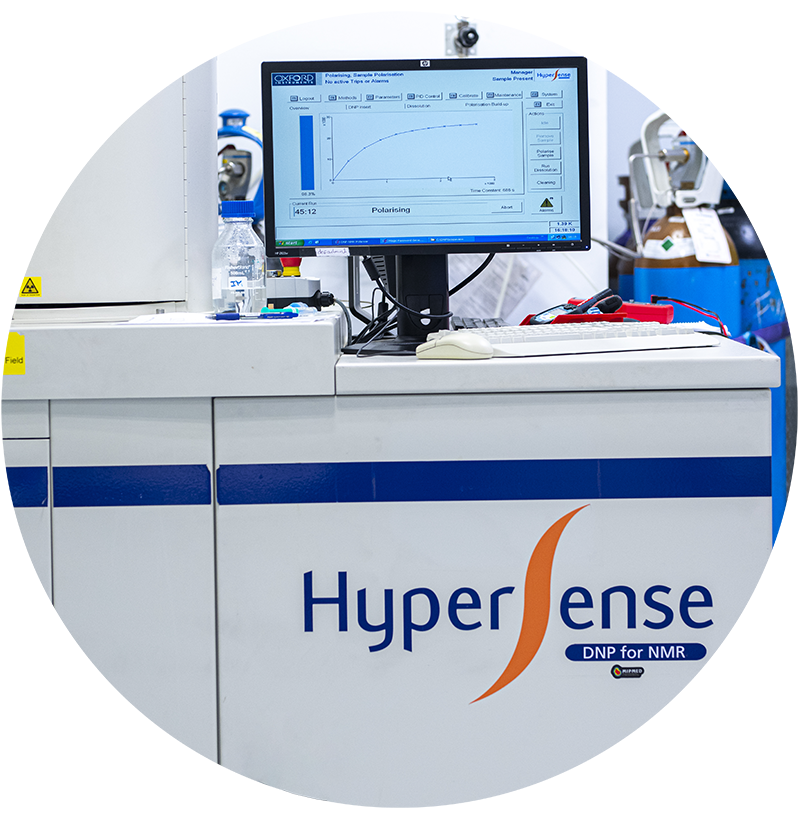
Hyperpolarised NMR (HP-NMR)
At the forefront of molecular imaging, our team specializes in hyperpolarized MR techniques, which amplify NMR signals over 10,000 times. This advancement allows real-time, non-invasive observation of molecular processes within a broad spectrum of biological systems, offering unprecedented insights into dynamic biological phenomena in real time. In our group we work with two HP methods: dissolution Dynamic nuclear polarization (dDDNP) and Parahydrogen Induced Polarization (PHIP).
Magnetic Resonance (MR) Imaging
Building upon the established clinical utility of MR imaging (MRI) for non-destructive tissue analysis, our work extends to MR spectroscopic imaging, which offers chemical specificity. This enables direct correlation between chemical compounds and biological events across various biological samples, including biofluids, cells, tissues, animal models, and clinical patients.
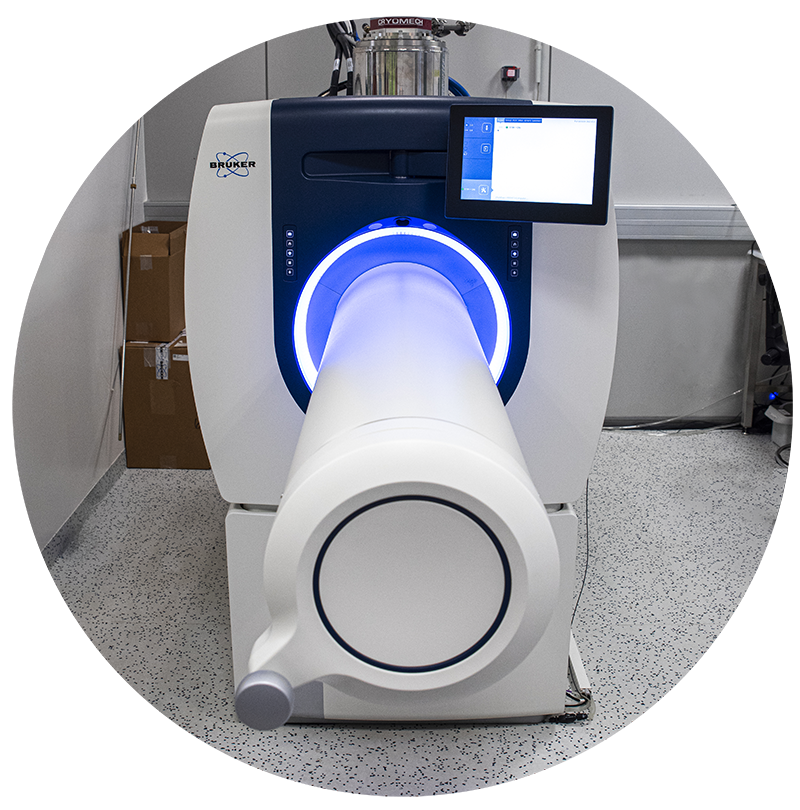
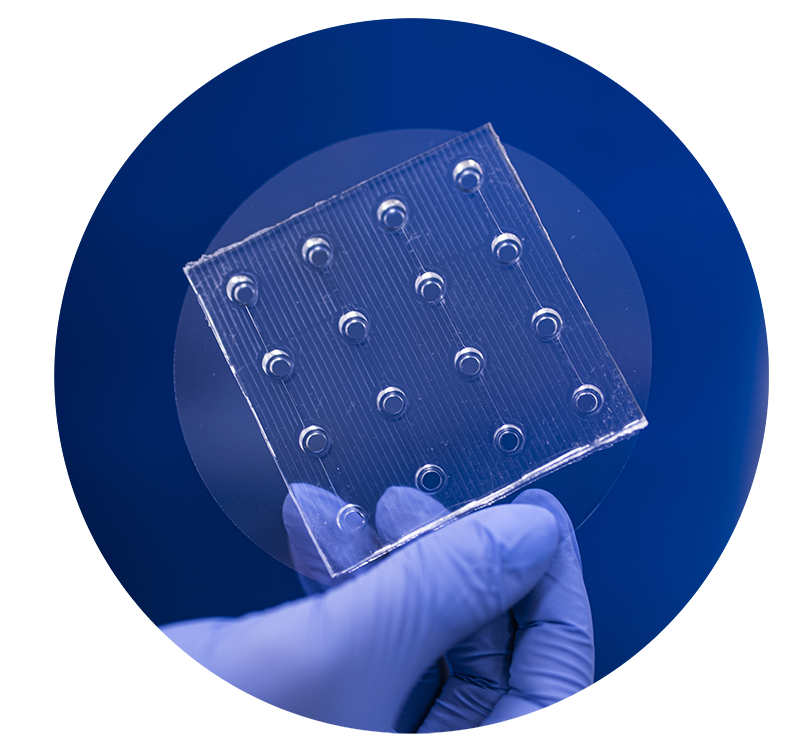
Microfluidic platforms
Microfluidic platforms, especially lab-on-a-chip devices, are revolutionizing the study of metabolism in disease by offering a compact and efficient means to analyze biological samples. These chips integrate intricate networks of microchannels and chambers, allowing for precise control and manipulation of small fluid volumes. A significant advantage of these platforms is their ability to accommodate multiple samples simultaneously for a single measurement, such as Magnetic Resonance Imaging (MRI). This unique design not only enhances throughput and reduces sample consumption but also enables high-resolution and multiplexed metabolic analysis. Consequently, microfluidic chips are becoming indispensable tools in biomedical research, providing valuable insights into disease mechanisms and facilitating the identification of metabolic biomarkers.
Metabolomics
Metabolomics is the comprehensive study of metabolites, the small molecules involved in metabolic processes within a biological system. Analysis of metabolites using NMR spectroscopy reveals insights into the biochemical activities occurring in cells, tissues, or organisms. This field is particularly useful for biomarker identification associated with particular diseases. Identifying these biomarkers can improve disease diagnosis, prognosis, and the development of personalized treatment strategies.
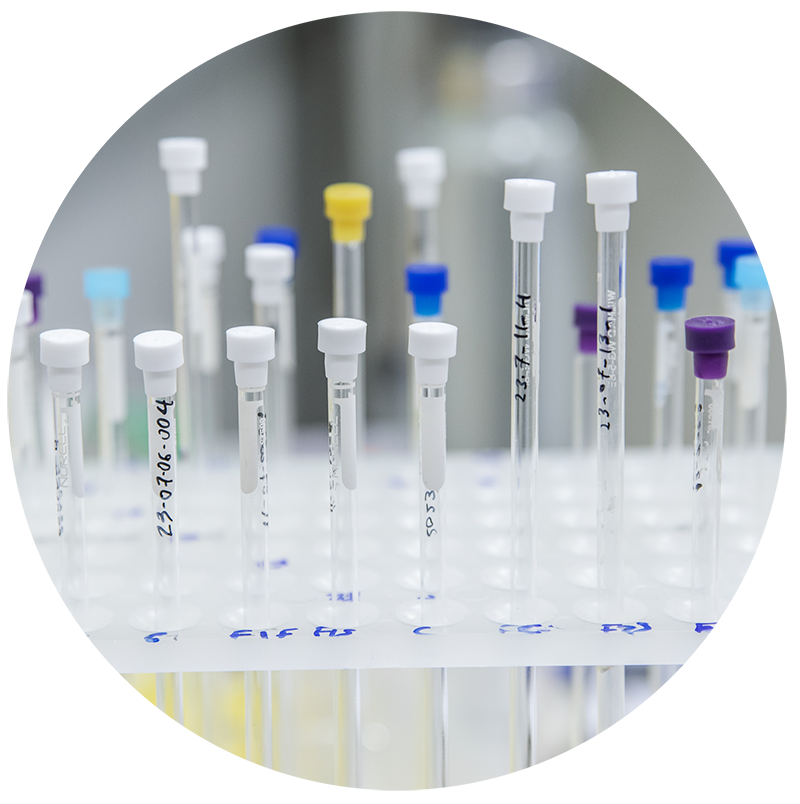
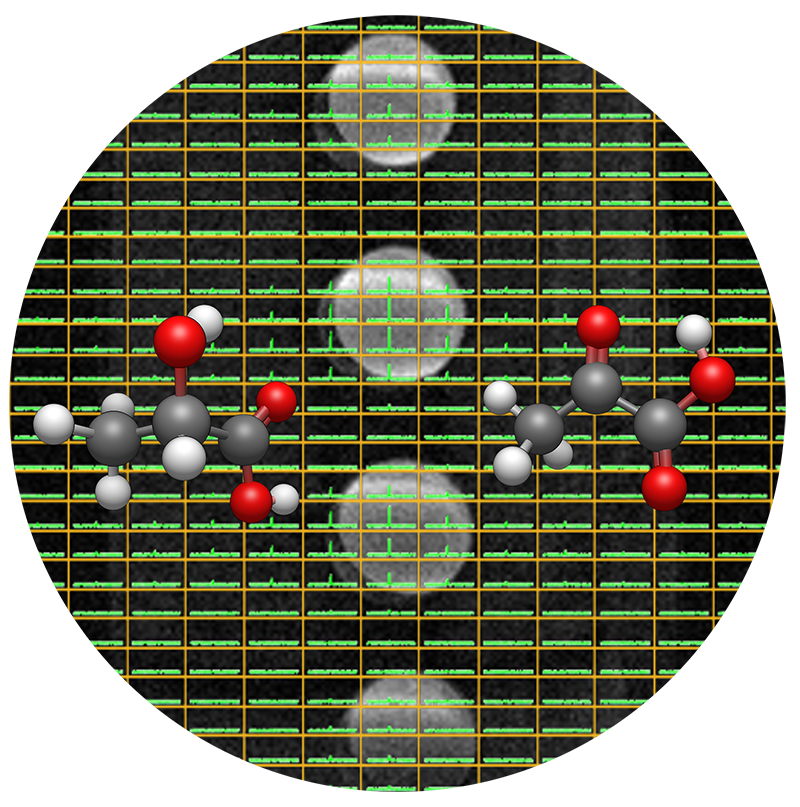
Computer Modelling of biological systems
By using the law of mass action, it is possible to model different cellular processes in a deterministic manner, and hence, describe these systems at a population level. These models can describe a wide range of processes, from gene expression and regulation to enzyme kinetics and particles movements thanks to membrane transporters.
STAFF
All group members:
PROJECTS
| INTERNATIONAL PROJETCS | FINANCER | PI |
|---|---|---|
| BLOC · Benchtop NMR for Lab-on-Chip (2020 – 2022) | European Commission, FET OPEN | Irene Marco |
| NATIONAL PROJECTS | FINANCER | PI |
|---|---|---|
| Analisis metabolico en tiempo real de modelos de cultivo de celulas 3d de la enfermedad del higado graso no alcoholico: organos en un chip y resonancia magnetica nuclear (2020 – 2021) | MINECO, Acciones Dinamización Europa Investigación/EIN2020-112209 | Irene Marco |
| Junior Leader Programe (2018 – 2022) | Obra Social La Caixa, Junior Leader Program | Irene Marco |
PUBLICATIONS
For a list of publications prior to joining IBEC, visit the Google Scholar.
Check for more detailed information on the outputs of the Group at IBEC CRIS portal.
Publications list:
NEWS
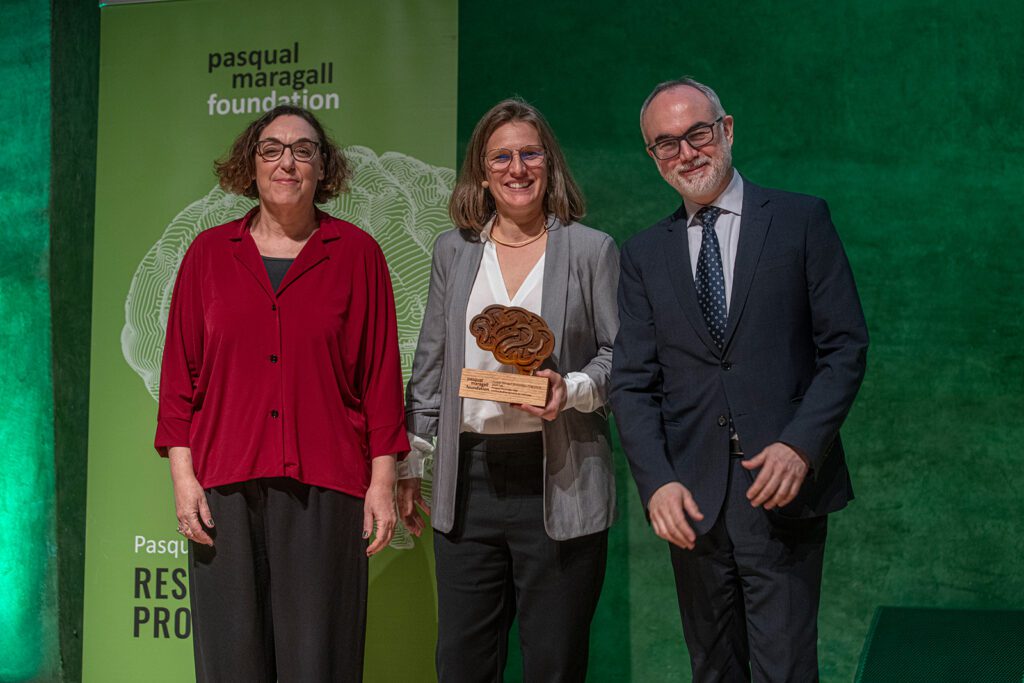
Amayra Hernández-Vega receives a grant from the Pasqual Maragall Foundation to advance research on the early stages of Alzheimer’s
IBEC researcher Amayra Hernández-Vega has been awarded a grant from the Pasqual Maragall Researchers Programme to lead a project focused on studying the earliest stages of Alzheimer’s disease. The study will combine in vitro and human models of familial Alzheimer’s disease to identify age-related factors and potential inhibitors that could slow the early progression of the disease. The project was presented at an informative session on sleep and brain health, which was attended by around 500 people.

Three IBEC projects receive ERC Proof of Concept funding to drive innovation in health, neuroscience, and biomedical technology
Dr Benedetta Bolognesi, Dr Irene Marco-Rius and Dr Nicolò Accanto, who are all principal investigators at IBEC, have each been awarded a prestigious ERC Proof of Concept grant. These grants are awarded by the European Research Council to support the exploration of the commercial and societal potential of research projects conducted within European institutions. The three winning projects range from new platforms for discovering antiamyloid drugs, to advanced metabolic analysis technologies, to optical tools for studying the brains of animals moving naturally.

Fundación “la Caixa”: Diálogos entre Irene Marco y Llucia Ramis
Irene Marco fue becada por la Fundación ”la Caixa” en dos ocasiones. La primera, para cursar un máster en Biofísica en la Universidad de Heidelberg (Alemania). La segunda, para desarrollar su investigación posdoctoral en Biología Molecular y Bioquímica en el IBEC. Esta es su historia contada a la periodista y escritora Llucia Ramis.
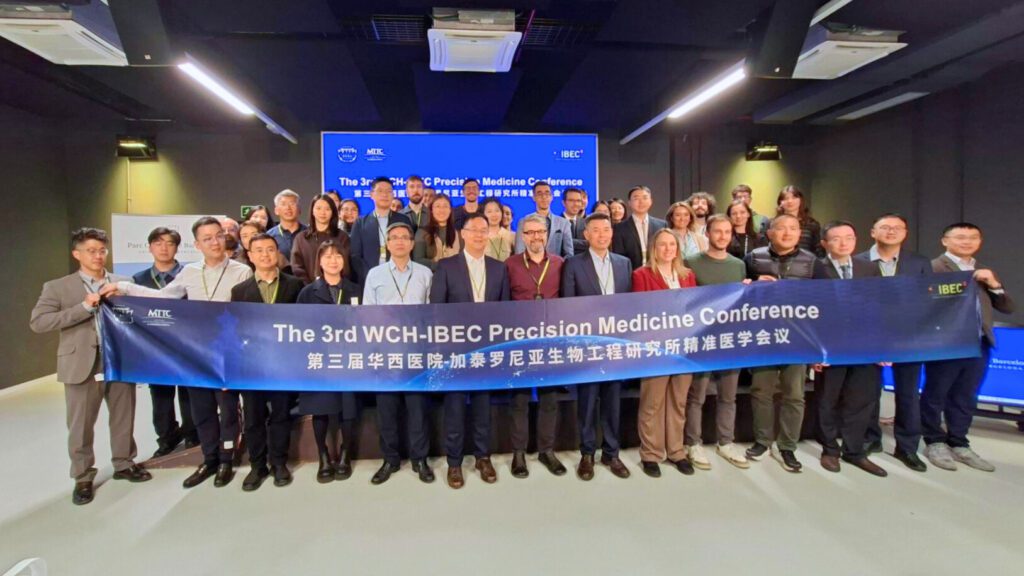
The IBEC and West China Hospital hold their third joint conference on precision medicine in Barcelona
Barcelona hosted the third IBEC-WCH Precision Medicine Conference this week, an event that further strengthened the strategic alliance between the Institute for Bioengineering of Catalonia (IBEC) and the West China Hospital of Sichuan University (WCHSU). The Chinese delegation visited Spain from 26 to 29 November, taking part in a busy schedule of scientific and institutional activities and exchanges between the two centres.
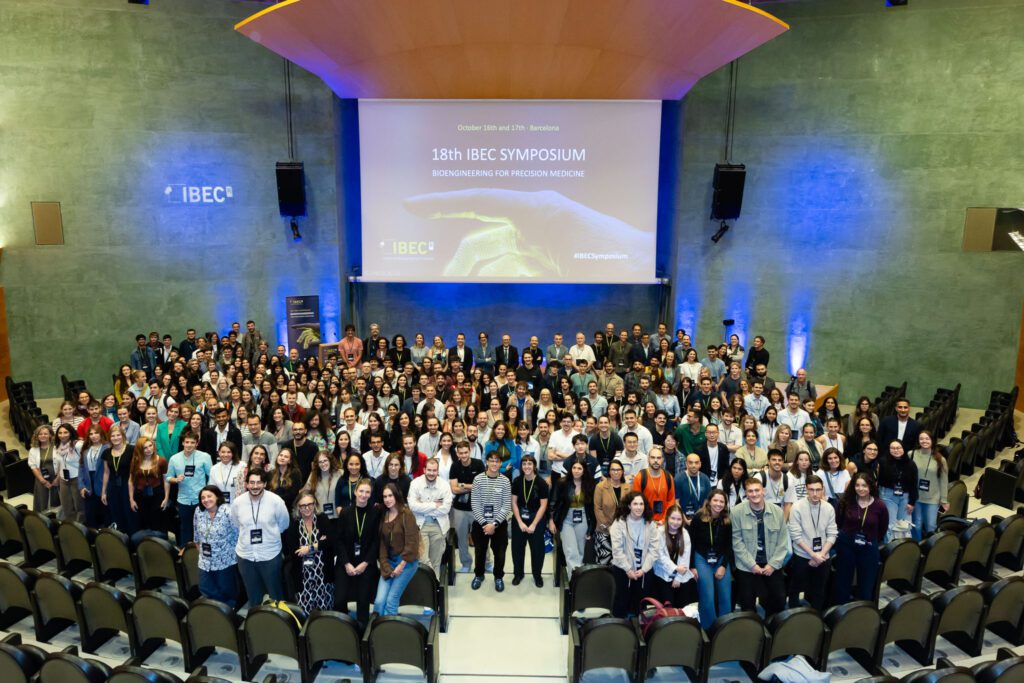
Bioengineering for precision medicine at the 18th IBEC Symposium
The 18th annual IBEC Symposium focused on ‘Bioengineering for Precision Medicine’, which is one of IBEC’s key areas of application. The event was attended by nearly 300 people, including local and international researchers. The multidisciplinary environment provided experts from other centres and the IBEC community with the opportunity to present their projects and exchange knowledge.
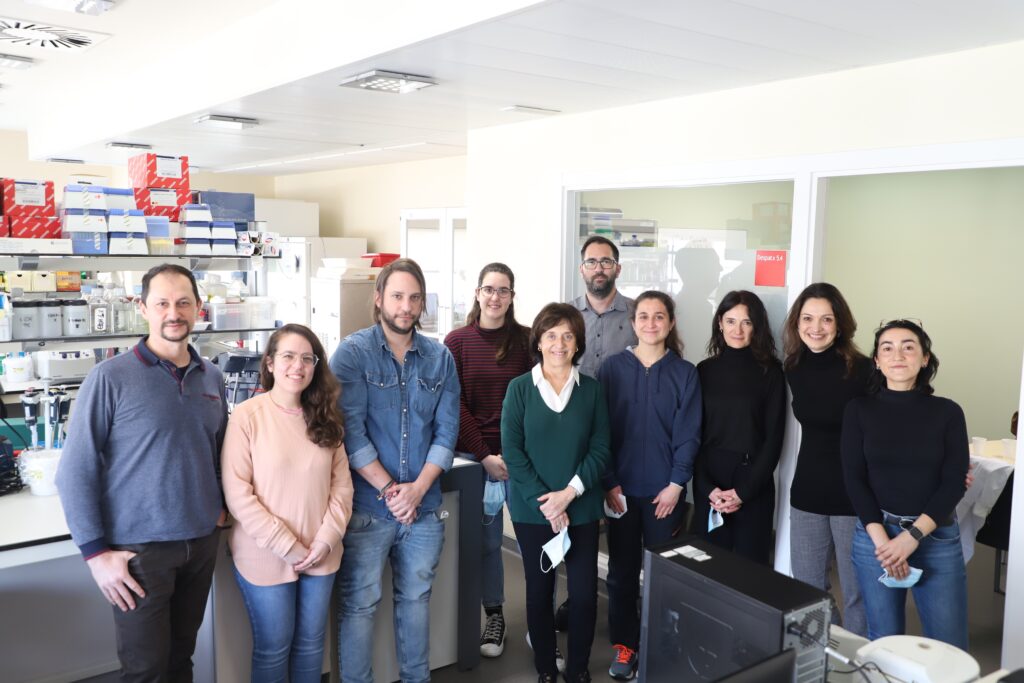
High-fat diets alter genes differently in males and females
A study led by the CIBER Diabetes and Associated Metabolic Diseases Area (CIBERDEM), in collaboration with the Institute for Bioengineering of Catalonia (IBEC), has shown that high-fat diets alter gene expression in key tissues for metabolic control in different ways depending on sex. These results provide a new perspective on how obesity affects people differently depending on their sex.
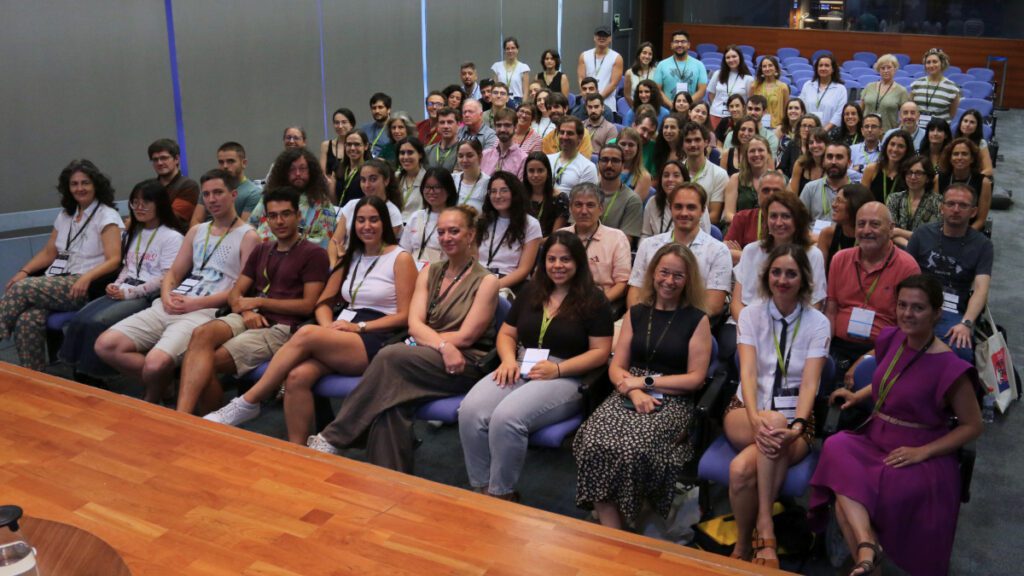
IBEC hosts the 5th Annual Meeting of the ISMRM Iberian Chapter
Barcelona hosted the 5th Annual Meeting of the International Society for Magnetic Resonance in Medicine (ISMRM) Iberian Chapter on 3 and 4 July, organised this year in collaboration with the Institute for Bioengineering of Catalonia (IBEC). The event brought together almost one hundred professionals from the field of magnetic resonance imaging to discuss the latest scientific, clinical, and computational advances.

IBEC researcher Irene Marco-Rius receives Anatole Abragam Prize for her contributions to the field of magnetic resonance
Dr Irene Marco-Rius, principal investigator at the Institute for Bioengineering of Catalonia (IBEC), has been awarded the 2025 Anatole Abragam Prize for her pioneering work on the use of magnetic resonance to study cells grown on chips, allowing ex vivo metabolic assessment of disease mechanisms and therapy responses in controlled microenvironments. The award was presented at the Joint ENC-ISMAR Conference in California.

IBEC and ICMS meet again in Eindhoven for their annual joint symposium
The joint ICMS-IBEC-MPIP symposium took place today, 24 March. The event was jointly organised by the Institute for Bioengineering of Catalonia (IBEC), the Institute for Complex Molecular Systems (ICMS) and the Max Planck Institute for Polymer Research (MPIP). During the day, researchers from the three centres presented their areas of research, with the aim of strengthening the scientific relations between the institutions.
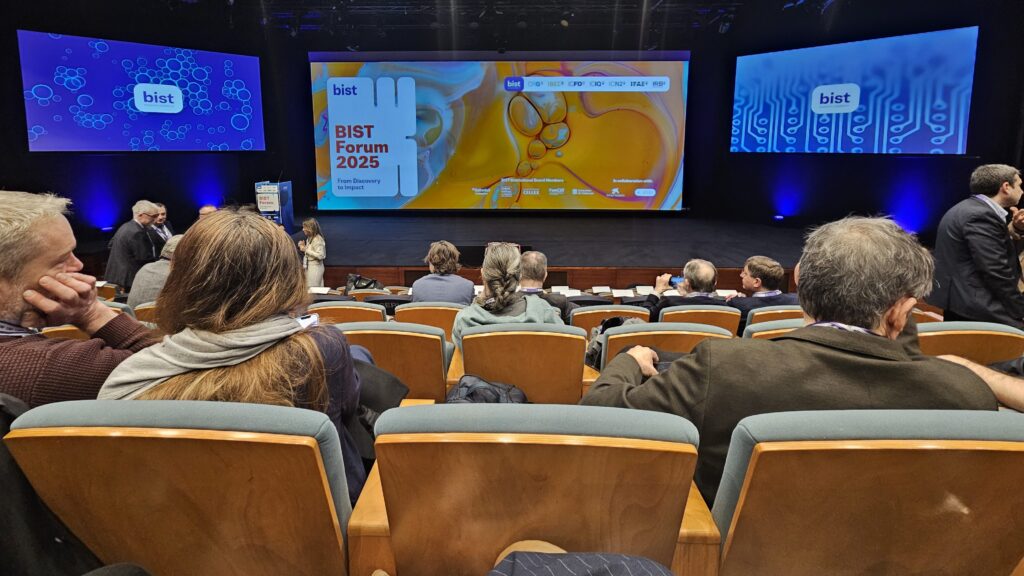
IBEC stands out at BIST Forum with 4 BIST Ignite projects and a BIST Ignite Award
Today, the BIST Forum, an event that brings together the BIST scientific community, focused this year on the joint initiative of the seven CERCA centres to promote precision medicine in healthy ageing. During the event, the new BIST Ignite projects to promote multidisciplinary research were announced, with IBEC involved in four of the five selected projects. In addition, one of the projects in which IBEC is involved won a BIST Ignite Award.
JOBS
Researcher in Training – Quantum-Enhanced & AI-Driven Metabolic Imaging
Ref: RT-IM // Deadline: 21/12/2025
Postdoctoral Researcher at the Molecular Imaging for Precision Medicine Research Group
Ref: PD-IM // Deadline: 27/10/2025
Biologist/postdoctoral researcher in MRI at the Research Group Molecular Imaging for Precision Medicine
Ref: PR-IM // Deadline: 31/07/2025
Engineer/postdoctoral researcher in NMR at the Research Group Molecular Imaging for Precision Medicine
Ref: PR-IM // Deadline: 31/08/2025
PhD candidate at the Research Group Molecular Imaging for Precision Medicine in Barcelona
Ref: PhD- IM // Deadline: 25/04/2025
Lab Technician at the Research Group Molecular Imaging for Precision Medicine in Barcelona
Ref: LT-IM // Deadline: 16/03/2025

